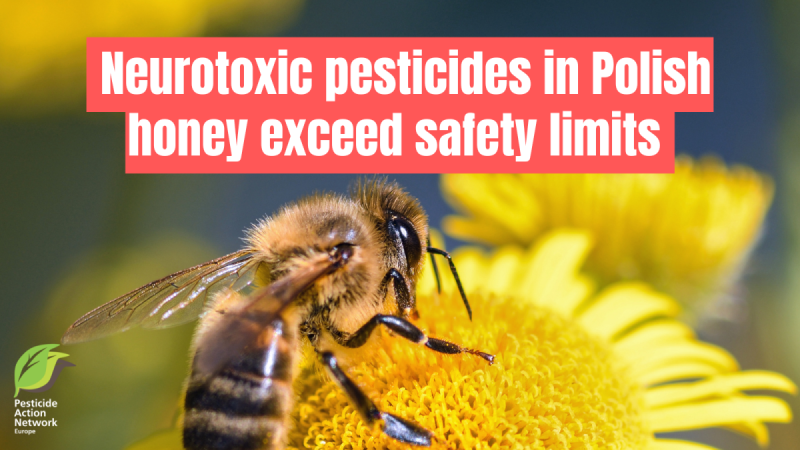An investigation of Polish honey reveals a deeply concerning level of contamination. Dangerous pesticides are even found in some of the honey produced by small, family-run apiaries. More than half of the samples contained acetamiprid, a brain-toxic neonicotinoid PAN Europe asks to ban immediately. A series of samples exceed regulatory health safety limits, demonstrating that stronger restrictions must be applied. However, instead of acting to solve this pollution problem, in June 2025 the EU Commission raised the maximum residue limit for acetamiprid in some products, including honey.
The investigation by Greenpeace Poland into the presence of pesticides in honey is part of the Adopt-A-Bee campaign. [1] A total of 48 honey samples were collected from across Poland, covering various types of honey, including rapeseed, buckwheat, and multifloral. The laboratory analyses revealed:
- 31 samples (65%) contained pesticide residues.
- Acetamiprid, a neonicotinoid pesticide, was found in 25 samples (52%). In 10 of these (21%), the concentration exceeded the current maximum residue level [2].
- Thiacloprid, another neonicotinoid banned across the EU since early 2021, appeared in 10 samples (20%), suggesting either illegal use or environmental persistence.
- Azoxystrobin, a fungicide known to impair bee development [3], was found in 4 samples - each time alongside acetamiprid.
Only 2 out of 16 rapeseed honeys (13%) were free from pesticide contamination, highlighting the widespread impact of intensive agricultural practices. Even though part of the honey samples provided come from wild flowers, it is highly worrying to observe that they are more contaminated than other food items, as 48% of tested food in 2022 contained pesticide residues compared to the 65% in honey.
Acetamiprid a substance of high concern
While acetamiprid is often presented by the agro-industry as a "bee-safe" alternative to older neonicotinoids, emerging science contradicts this assumption. It may pose serious long-term risks both to pollinators and to human health.
- Pollinator impact:
- Studies show that acetamiprid becomes a greater risk to bees when combined with other pesticides. [4] It can impair bee motor function and larval development—especially in wild, solitary bee species.
- Human health risk:
- New research shows that acetamiprid—a neonicotinoid pesticide—may pose serious risks to human health. Studies indicate it can act as an endocrine disruptor, potentially contributing to breast cancer and infertility. [5]
- It also crosses the placental and brain barriers, raising concerns for fetal and infant development. Acetamiprid has been detected in umbilical cords, breast milk, and even children’s cerebrospinal fluid. [6]
- Alarmingly, it may have nicotine-like effects on the developing brain, increasing the risk of low birth weight, sudden infant death, behavioral disorders and reduced IQ in children. [7]
The widespread contamination of the environment and honey with acetamiprid stems from the massive use of this substance in seed coating for rapeseed. Indeed, a few years ago, following a request by Germany to increase allowed residues in honey in order to allow for the use of this neurotoxic on rapeseed, a melliferous crop.
A rising pesticide use in Poland
Despite EU efforts to reduce pesticide use by 50% by 2030, Poland is moving in the opposite direction. According to Greenpeace Poland:
- The number of registered pesticides has more than doubled since 2005.
- In 2023 alone, nearly 27,000 tonnes of active pesticide substances were sold in Poland—four times more than 30 years ago.
- Poland’s per-hectare pesticide use is one of the fastest-growing rates in the EU.
This escalation contradicts the national obligations of pesticide reduction under the EU Directive on the Sustainable Use of Pesticides. It also undermines EU strategies on biodiversity and the environment like the Nature Restoration Law.
The presence of banned and harmful pesticides in Polish honey reveals more than just a consumer health issue - it reflects an agriculture system heavily dependent on chemicals, with little room left for ecological resilience. The results should urge policymakers to rethink current pesticide practices.
Read more:
- The published results are here (in Polish)
- Acetamiprid: the brain-toxic neonicotinoid we must urgently leave behind
- Alternative plant protection - benefits for farmers, consumers and environment, conference in Warsaw, March 2025
Notes:
[1] Adopt-A-Bee campaign in Poland
[2] Maximum residue levels, EU database
